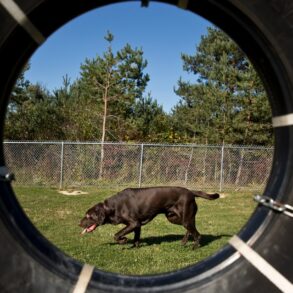
It’s not uncommon to hear someone refer to their dog as their “fur baby,” or to themselves as a “dog mom” or “pet parent.” At the same time, dog ownership has risen across many countries where fertility rates have remained stable, or even decreased — leading some to question if potential parents are foregoing human children in favor of a fluffier option.
Are dogs replacing children? Researchers from Eötvös Loránd University in Hungary say that there actually is a link between increased dog ownership and declining birth rates, but not in the way you might think.
“Some studies suggest that dog owners indeed have more negative views of motherhood, and mothers who own dogs find parenting more burdensome, which could reduce their willingness to have more children,” said lead researcher, Professor Enikő Kubinyi, in a university press release. “In some cases, dogs may even harm romantic relationships. But that’s only one side of the story.”
Kubinyi explored the connection between down ownership in birth rates in an article published in the journal Current Directions in Psychological Science.
Previous research has shown that dog ownership in the United States has increased by 37 million since 1996, surpassing the number of children. More U.S. households are now homes to dogs than kids. And, a study out of Hungary showed that 19% of childless dog owners, and 10% of owners with children, considered their dog more important than any human life.
So, yes, we clearly love our dogs.
Kubinyi explained that there are cultural assumptions that our love for pets trumps our love for children. Studies have shown that women with more positive attitudes towards dogs tend to have a more negative view of motherhood. Dogs also require time and energy, and may place a financial burden on their owners that could dissuade them from investing in (famously expensive) children.
However, the number of people who regard their dog as a substitute for children is actually quite low, and in fact, families with children are more likely to own dogs. But, if that’s the case, why are more people getting dogs, and less people having kids?
Kubinyi’s groundbreaking theory is that increased dog ownership is not limiting human fertility, but actually the other way around—declining fertility rates are in fact contributing to increased dog ownership, and their growing role in people’s lives.
As modern culture becomes more isolating, as we move further away from our families and mourn the loss of the village, Kubinyi says that dogs may help fill the void of our missing social connections.
“The changing role of dog ownership suggests that people in Western societies experience a significant lack of caregiving and social support — and they try to compensate for this, at least in part, with dogs and likely cats as well,” Kubinyi said.
So, there you have it. Dogs aren’t a substitute for children — people just aren’t having as many of them in the first place, and we might be feeling a bit lonely about it. A furry companion might be many people’s solution.
This post was originally published on this site be sure to check out more of their content.













































